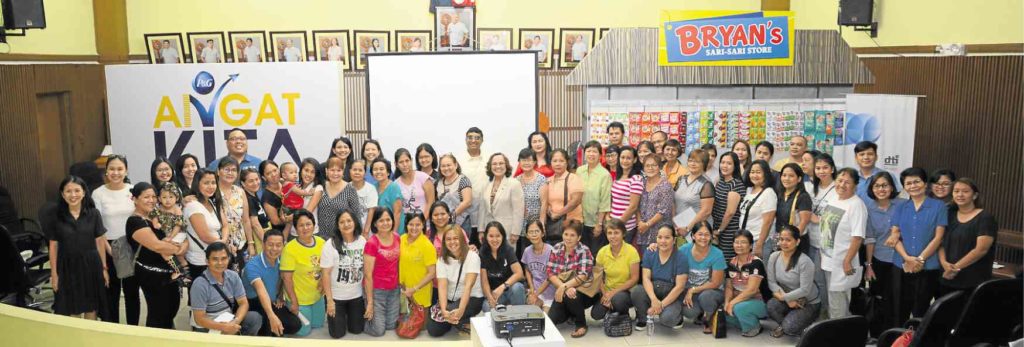
Some 50 microentrepreneurs participated in the pilot session in Mandaluyong City of the Angat Kita program spearheaded by P&G.
Before convenience stores sprouted all over the country, one only had to walk a few blocks from home to buy soap and shampoo from the nearest sari-sari store.
These neighborhood variety stores, opening in early morning and closing late at night just to keep their “suki” happy, had been living by the word “convenience” for consumers even before big business used the word to describe their stores.
But these beloved sari-sari stores are facing great challenges.
More convenience stores are opening, redefining what convenience means with an expanded selection of products and store hours that extend beyond the usual operating time of sari-sari store owners.
For example, the country’s leading convenience store operator, Philippine Seven Corp., had over 2,000 7-11 stores in the country as of May. On top of this, the company is even ramping up efforts to attract more franchisees, requiring only P300,000 in cash outlay, marking the company’s simplest and most affordable franchising package to date.
The question now is how long will sari-sari stores be able to stay in the market, given the aggressive marketing tools of convenience stores nationwide.
A top official of P&G Philippines, however, thinks that the reliable sari-sari stores, which he said were mostly operated by women, are here to stay.
Sari-sari store owners are an important demographic for the local arm of Procter & Gamble Co., given that, according to company General Manager Shankar Viswanathan, sari-sari stores account for 40 to 45 percent of company sales in the country.
P&G Philippines—the company that popularized brands such as Ariel, Tide, Safeguard, and Head and Shoulders—still thinks that sari-sari store owners will remain relevant although there will be increased competition from convenience stores.
DTI Undersecretary Zenaida Maglaya with P&G GM Shankar Viswanathan at the launch of the Angat Kita program in Mandaluyong City.
“I think about 40 to 45 percent of our sales will come from our sari-sari store owners. If you look at the economic data of the country, the way the economy is growing, you will see that the cake is expanding. There is more in it for all the channels, not only supermarkets, but sari-sari store owners,” he said.
In line with this, P&G, along with the Department of Trade and Industry, launched in July the pilot of its “Angat Kita” program, an initiative which aims to help sari-sari store owners maximize their potential in generating income and sustaining livelihood in order to “ultimately uplift their current status.”
It was launched in Mandaluyong City, the first of five cities targeted for this year. The plan is to reach out to at least a thousand micro-entrepreneurs.
“The cake is becoming bigger and there is more for everybody. There is a good opportunity to invest,” Viswanathan said.
In a statement, the company said that around 50 program participants in Mandaluyong City learned concepts such as merchandising and inventory management in a bid to make sari-sari store owners “more competitive micro-entrepreneurs.”
The participants received seed capital in the form of starter kit packs comprised of P2,500 worth of P&G’s fastest moving products such as Pantene, Whisper, Joy, and Safeguard.
“It’s a happy competition,” said Trade Undersecretary Zenaida Cuison Maglaya in an interview with reporters, commenting on the co-existence of sari-sari stores and convenience stores.
“That’s the reason why we have to give [sari-sari store owners] sessions so they can compete with all these convenience stores that are sprouting everywhere,” she added.
P&G has been here in the country for more than 80 years now.
In recent years, the company spearheaded the rehabilitation of over 4,000 public market stalls, kiosks, and sari-sari stores devastated by Typhoon Yolanda (Haiyan) to help them regain their livelihood.